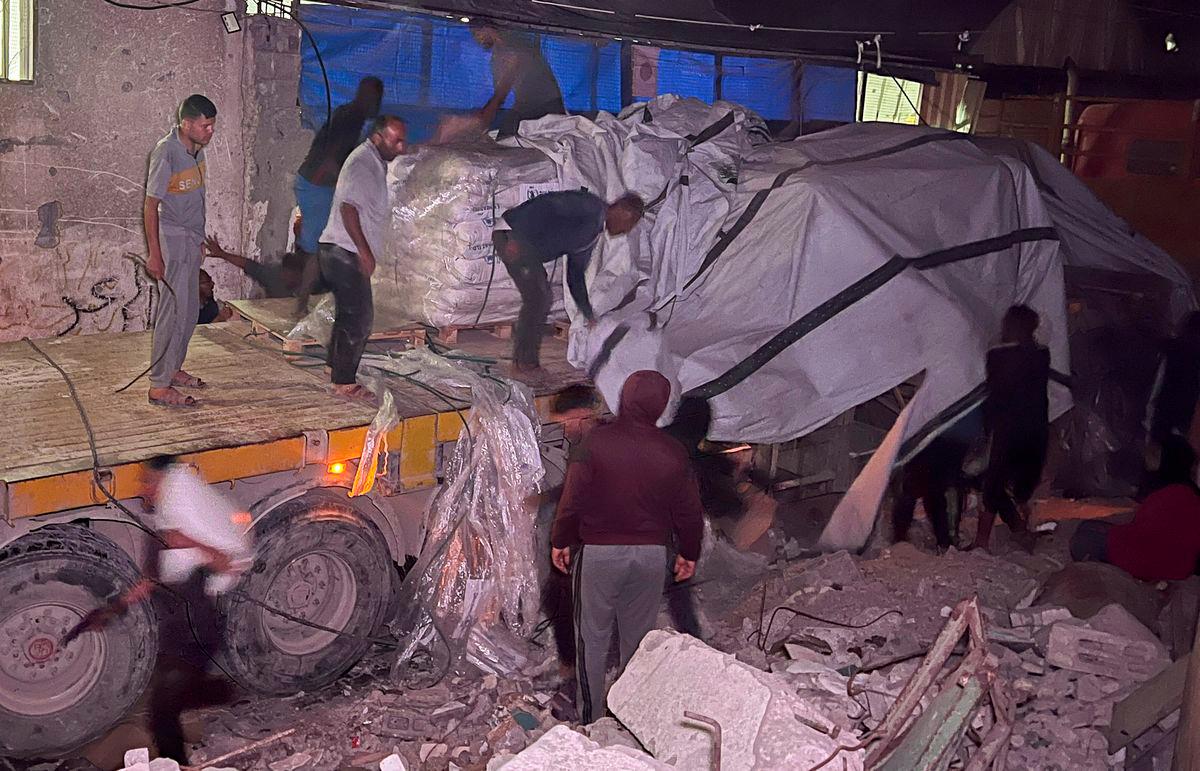CAIRO/JERUSALEM: Israel allowed 100 aid trucks carrying flour, baby food and medical equipment into the Gaza Strip on Wednesday, the Israeli military said, as UN officials reported that distribution issues had meant that no aid had so far reached people in need.
Prime Minister Benjamin Netanyahu said Israel would be open to a temporary ceasefire to enable the return of hostages. But otherwise he said it would press ahead with a military campaign to gain total control of Gaza.
After an 11-week blockade on supplies entering Gaza, the Israeli military said a total of 98 aid trucks entered on Monday and Tuesday. But even those minimal supplies have not made it to Gaza's soup kitchens, bakeries, markets and hospitals, according to aid officials and local bakeries that were standing by to receive supplies of flour.
“None of this aid - that is a very limited number of trucks - has reached the Gaza population,“ said Antoine Renard, country director of the World Food Programme.
The blockade has left Gazans in an increasingly desperate struggle for survival, despite growing international and domestic pressure on Israel’s government, which one opposition figure said risked turning the country into a “pariah state”.
Thousands of tons of food and other vital supplies are waiting near crossing points into Gaza but until it can be safely distributed, around a quarter of the population remains at risk of famine, Renard said.
“I’m here since eight in the morning, just to get one plate for six people while it is not enough for one person,“ said Mahmoud al-Haw, who says he often waits for up to six hours a day hoping for some lentil soup to keep his children alive.
U.N. officials said security issues had prevented the aid from moving out of the logistics hub at the Kerem Shalom crossing point but late on Wednesday there appeared some hope that supplies would move more freely.
Nahid Shahaiber, a major transport company owner, said 75 trucks of flour and over a dozen more carrying nutritional supplements and sugar were inside the southern area of Rafah and witnesses said trucks carrying flour had been seen in Deir Al-Balah in the central Gaza Strip.
Israel imposed a blockade on all supplies entering Gaza in March, saying Hamas was seizing supplies meant for civilians - a charge the group denies.
Under mounting international pressure, it has allowed aid deliveries by the U.N. and other aid groups to resume briefly until a new U.S.-backed distribution model using private contractors operating through so-called secure hubs is up and running by the end of the month. But the United Nations says the plan is not impartial or neutral, and it will not be involved.
'PARIAH STATE'
As people waited for supplies to arrive, air strikes and tank fire killed at least 50 people across the Gaza Strip on Wednesday, Palestinian health authorities said. The Israeli military said air strikes hit 115 targets, which it said included rocket launchers, tunnels and unspecified military infrastructure.
Efforts to halt the fighting have faltered, with both Hamas, which insists on a final end to the war and withdrawal of Israeli forces, and Israel, which says Hamas must disarm and leave Gaza, sticking to positions the other side rejects.
Netanyahu said an Israeli air strike this month had probably killed Hamas leader Mohammed Sinwar and he reiterated his demand for the complete demilitarization of Gaza and the exile of Hamas leaders for the war to end.
The resumption of the assault on Gaza since March, following a two-month ceasefire, has drawn condemnation from countries including Britain and Canada that have long been cautious about expressing open criticism of Israel. Even the United States, the country's most important ally, has shown signs of losing patience with Netanyahu.
Netanyahu said it was “a disgrace” that countries like Britain were sanctioning Israel instead of Hamas.
There has been growing unease within Israel meanwhile at the continuation of the war while 58 hostages remain in Gaza.
Left-wing opposition leader Yair Golan drew a furious response from the government and its supporters this week when he declared that “A sane country doesn’t kill babies as a hobby” and said Israel risked becoming a “pariah state among the nations.”
Golan, a former deputy commander of the Israeli military who went single-handedly to rescue victims of the Hamas attack on Israel on Oct 7, 2023, leads the left-wing Democrats, a small party with little electoral clout.
But his words, and similar comments by former Prime Minister Ehud Olmert in an interview with the BBC, underscored the rift within Israel. Netanyahu dismissed the criticism, saying he was “appalled” by Golan’s comments.
Opinion polls show widespread support for a ceasefire that would include the return of all the hostages, with a survey from the Hebrew University of Jerusalem this week showing 70% in favour of a deal.
But hardliners in the cabinet, some of whom argue for the complete expulsion of all Palestinians from Gaza, have insisted on continuing the war until “final victory”, which would include disarming Hamas as well as the return of the hostages.
Netanyahu, trailing in the opinion polls and facing trial at home on corruption charges, which he denies, as well as an arrest warrant from the International Criminal Court, has so far sided with the hardliners.
Israel launched its campaign in Gaza in response to the Hamas attack on October 7, 2023, which killed some 1,200 people by Israeli tallies and saw 251 hostages abducted into Gaza.
The campaign has killed more than 53,600 Palestinians, according to Gaza health authorities, and devastated the coastal strip, where aid groups say signs of severe malnutrition are widespread.









